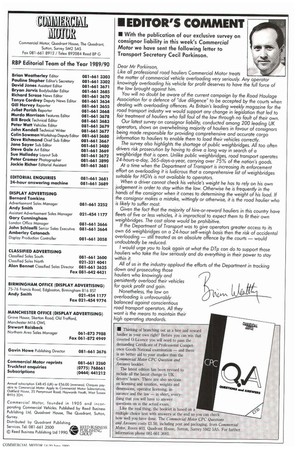"EDITOR'S COMMENT
Page 13

If you've noticed an error in this article please click here to report it so we can fix it.
• With the publication of our exclusive survey on consignor liability in this week's Commercial Motor we have sent the following letter to Transport Secretary Cecil Parkinson.
Dear Mr Parkinson,
Like all professional road hauliers Commercial Motor treats the matter of commercial vehicle overloading very seriously. Any operator knowingly overloading his vehicle for profit deserves to have the full force of the law brought against him.
You will no doubt be aware of the current campaign by the Road Haulage Association for a defence of "due diligence" to be accepted by the courts when dealing with overloading offences. As Britain's leading weekly magazine for the road transport industry we would support any change in legislation that led to fair treatment of hauliers who fall foul of the law through no fault of their own.
Our latest survey on consignor liability, conducted among 200 leading UK operators, shows an overwhelming majority of hauliers in favour of consignors being made responsible for providing comprehensive and accurate cargo information to hauliers to enable them to load their vehicles correctly.
The survey also highlights the shortage of public weighbridges. All too often drivers risk prosecution by having to drive a long way in search of a weighbridge that is open. Unlike public weighbridges, road transport operates 24-hours-a-day, 365-days-a-year, carrying over 75% of the nation's goods.
At a time when the Department of Transport is increasing its enforcement effort on overloading it is ludicrous that a comprehensive list of weighbridges suitable for HGVs is not available to operators.
When a driver cannot check his vehicle's weight he has to rely on his own judgement in order to stay within the law. Otherwise he is frequently in the hands of the consignor when it comes to determining the weight of his load. If the consignor makes a mistake, wittingly or otherwise, it is the road haulier who is likely to suffer most.
Given the fact that the majority of hire-or-reward hauliers in this country have fleets of five or less vehicles, it is impractical to expect them to fit their own weighbridges. The cost alone would be prohibitive.
If the Department of Transport was to give operators greater access to its own 66 weighbridges on a 24-hour self-weigh basis then the risk of accidental overloading — still treated as an absolute offence by the courts — would undoubtedly be reduced.
I would urge you to look again at what the DTp can do to support those hauliers who take the law seriously and do everything in their power to stay within it.
All of us in the industry applaud the efforts of the Department in tracking down and prosecuting those hauliers who knowingly and persistently overload their vehicles for quick profit and gain.
Nonetheless, the law on overloading is unfavourably balanced against conscientious road transport operators. All they want is the means to maintain their high operating standards.




















































































































